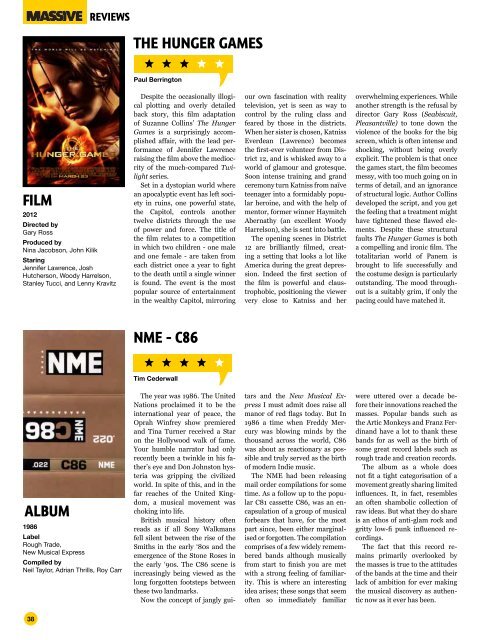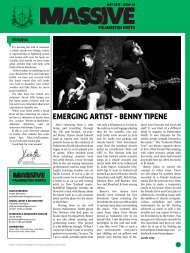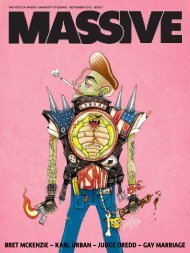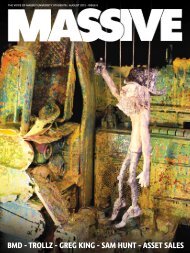APRIL 2012 - ISSUE 03 - Massive Magazine
APRIL 2012 - ISSUE 03 - Massive Magazine
APRIL 2012 - ISSUE 03 - Massive Magazine
Create successful ePaper yourself
Turn your PDF publications into a flip-book with our unique Google optimized e-Paper software.
REVIEWS<br />
THE HUNGER GAMES<br />
Paul Berrington<br />
FILM<br />
<strong>2012</strong><br />
Directed by<br />
Gary Ross<br />
Produced by<br />
Nina Jacobson, John Kilik<br />
Staring<br />
Jennifer Lawrence, Josh<br />
Hutcherson, Woody Harrelson,<br />
Stanley Tucci, and Lenny Kravitz<br />
Despite the occasionally illogical<br />
plotting and overly detailed<br />
back story, this film adaptation<br />
of Suzanne Collins’ The Hunger<br />
Games is a surprisingly accomplished<br />
affair, with the lead performance<br />
of Jennifer Lawrence<br />
raising the film above the mediocrity<br />
of the much-compared Twilight<br />
series.<br />
Set in a dystopian world where<br />
an apocalyptic event has left society<br />
in ruins, one powerful state,<br />
the Capitol, controls another<br />
twelve districts through the use<br />
of power and force. The title of<br />
the film relates to a competition<br />
in which two children - one male<br />
and one female - are taken from<br />
each district once a year to fight<br />
to the death until a single winner<br />
is found. The event is the most<br />
popular source of entertainment<br />
in the wealthy Capitol, mirroring<br />
our own fascination with reality<br />
television, yet is seen as way to<br />
control by the ruling class and<br />
feared by those in the districts.<br />
When her sister is chosen, Katniss<br />
Everdean (Lawrence) becomes<br />
the first-ever volunteer from District<br />
12, and is whisked away to a<br />
world of glamour and grotesque.<br />
Soon intense training and grand<br />
ceremony turn Katniss from naïve<br />
teenager into a formidably popular<br />
heroine, and with the help of<br />
mentor, former winner Haymitch<br />
Abernathy (an excellent Woody<br />
Harrelson), she is sent into battle.<br />
The opening scenes in District<br />
12 are brilliantly filmed, creating<br />
a setting that looks a lot like<br />
America during the great depression.<br />
Indeed the first section of<br />
the film is powerful and claustrophobic,<br />
positioning the viewer<br />
very close to Katniss and her<br />
overwhelming experiences. While<br />
another strength is the refusal by<br />
director Gary Ross (Seabiscuit,<br />
Pleasantville) to tone down the<br />
violence of the books for the big<br />
screen, which is often intense and<br />
shocking, without being overly<br />
explicit. The problem is that once<br />
the games start, the film becomes<br />
messy, with too much going on in<br />
terms of detail, and an ignorance<br />
of structural logic. Author Collins<br />
developed the script, and you get<br />
the feeling that a treatment might<br />
have tightened these flawed elements.<br />
Despite these structural<br />
faults The Hunger Games is both<br />
a compelling and ironic film. The<br />
totalitarian world of Panem is<br />
brought to life successfully and<br />
the costume design is particularly<br />
outstanding. The mood throughout<br />
is a suitably grim, if only the<br />
pacing could have matched it.<br />
NME - C86<br />
Tim Cederwall<br />
ALBUM<br />
1986<br />
Label<br />
Rough Trade,<br />
New Musical Express<br />
Compiled by<br />
Neil Taylor, Adrian Thrills, Roy Carr<br />
The year was 1986. The United<br />
Nations proclaimed it to be the<br />
international year of peace, the<br />
Oprah Winfrey show premiered<br />
and Tina Turner received a Star<br />
on the Hollywood walk of fame.<br />
Your humble narrator had only<br />
recently been a twinkle in his father’s<br />
eye and Don Johnston hysteria<br />
was gripping the civilized<br />
world. In spite of this, and in the<br />
far reaches of the United Kingdom,<br />
a musical movement was<br />
choking into life.<br />
British musical history often<br />
reads as if all Sony Walkmans<br />
fell silent between the rise of the<br />
Smiths in the early ‘80s and the<br />
emergence of the Stone Roses in<br />
the early ‘90s. The C86 scene is<br />
increasingly being viewed as the<br />
long forgotten footsteps between<br />
these two landmarks.<br />
Now the concept of jangly guitars<br />
and the New Musical Express<br />
I must admit does raise all<br />
manor of red flags today. But In<br />
1986 a time when Freddy Mercury<br />
was blowing minds by the<br />
thousand across the world, C86<br />
was about as reactionary as possible<br />
and truly served as the birth<br />
of modern Indie music.<br />
The NME had been releasing<br />
mail order compilations for some<br />
time. As a follow up to the popular<br />
C81 cassette C86, was an encapsulation<br />
of a group of musical<br />
forbears that have, for the most<br />
part since, been either marginalised<br />
or forgotten. The compilation<br />
comprises of a few widely remembered<br />
bands although musically<br />
from start to finish you are met<br />
with a strong feeling of familiarity.<br />
This is where an interesting<br />
idea arises; these songs that seem<br />
often so immediately familiar<br />
were uttered over a decade before<br />
their innovations reached the<br />
masses. Popular bands such as<br />
the Artic Monkeys and Franz Ferdinand<br />
have a lot to thank these<br />
bands for as well as the birth of<br />
some great record labels such as<br />
rough trade and creation records.<br />
The album as a whole does<br />
not fit a tight categorisation of a<br />
movement greatly sharing limited<br />
influences. It, in fact, resembles<br />
an often shambolic collection of<br />
raw ideas. But what they do share<br />
is an ethos of anti-glam rock and<br />
gritty low-fi punk influenced recordings.<br />
The fact that this record remains<br />
primarily overlooked by<br />
the masses is true to the attitudes<br />
of the bands at the time and their<br />
lack of ambition for ever making<br />
the musical discovery as authentic<br />
now as it ever has been.<br />
38













